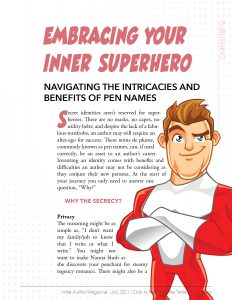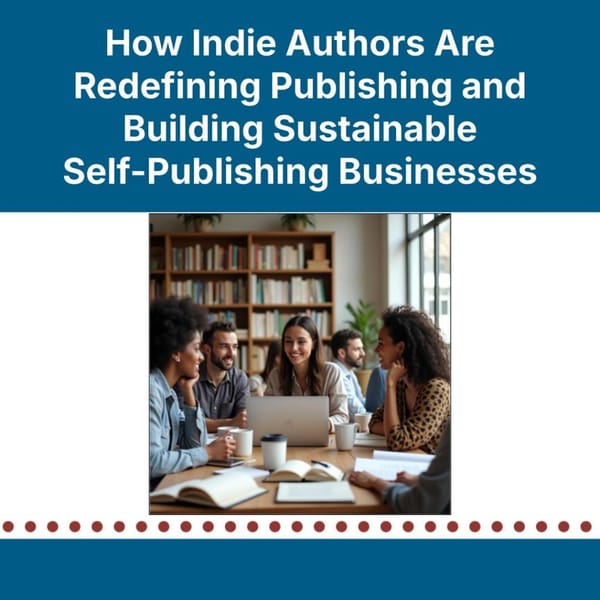Is It Time to Embrace Your Inner Superhero?
Secret identities aren’t reserved for superheroes. There are no masks, no capes, no utility belts; and despite the lack of a fabulous wardrobe, an author may still require an alter-ego for success. These noms de plume, commonly known as pen names, can, if used correctly, be an asset to an author’s career. Inventing an identity comes with benefits and difficulties an author may not be considering as they conjure their new persona. At the start of your journey you only need to answer one question, “Why?”
Why the secrecy?
Privacy
The reasoning might be as simple as, “I don’t want my family/job to know that I write or what I write.” You might not want to make Nanna blush as she discovers your penchant for steamy regency romance. There might also be a career conflict where an employer would be less than thrilled to discover you wrote bone-chilling horror. Urban Fantasy Romance author Dora Blume, whose real name is Danielle Staley, encountered a less than open mind from her day job supervisor. Blume, a former middle school English teacher, recalls, “When I used my [legal] name for my Fat Girl Problems blog, I had parent complaints. I was asked by a principal to take down the blog.”
Brand Division
There are also logistical reasons behind wanting to develop a new persona. While some genres such as fantasy and urban fantasy might intermingle on the bookshelf, the way they are discovered through online retailers is not as straightforward. Jenn Falls, writing as Bella Falls, has found success in the cozy mystery genre. However, she maintains separate pen names for her romance and paranormal series. Standing firmly behind the idea of not polluting any of her brands, she is preparing to launch a new name. “Even though I have readers that would read [pen name] ... when I launch, I will keep it in a vacuum so I can see how it does on its own. After hyper targeted ads, I might let it be known.”
Gender
Reader expectations can also impact the decision. Joanna Penn writes in the male-dominated thriller genre under the pseudonym J.F. Penn, despite a successful career publishing non-fiction. We can find the opposite as males tackle female dominated genres such as cozy mystery or romance. Tyler Davis and his wife wrote paranormal cozy mysteries under the pen name Christine Zane Thomas. Tyler has since fully assumed the identity of their erstwhile joint pen name. It makes sense to continue publishing under a name he helped make successful, but it comes as a double-edged sword. He says, “I feel disingenuous when people message my page and talk to me.”
Name Conflicts
Because an author relies on discoverability regardless of platform, sometimes the why is as simple as ease. Having a common name such as “Smith,” means that it can quickly push an author down the search results. It can also be a case of having a name that is difficult to pronounce or even spell. Timothy Cerepaka, who writes under Lucas Flint states, “it is easier to spell/remember than my real name while remaining distinct.” However, he is quick to offer a word of caution, “I like [the name] Lucas Flint, so I don’t mind it when people call me that, even though it’s not my real name … pick a good name and prepare to get used to it.”
Behind the Mask
No matter an author’s reasoning, they must know not all pen names are created equal. The need for a pen name has been established, then what? Authors use different approaches to their pen names depending on their unique situations. Ultimately, it boils down to privacy, and how secret the name will need to be to achieve an author’s goals. It can roughly break down into three categories: public, semi-private, and anonymous.
Public Identity
This is the maskless superhero approach. It allows the world to know that an author is assuming multiple identities, and is mostly born out of administrative logistics. Barry Hutchison traditionally published children’s books under his legal name, but published his first science fiction under Barry J. Hutchison to denote books written for “adults.” “I didn’t want kids looking for the next Barry Hutchison book … to [find] a book where a person is tortured to death or set on fire.”
Benefits: Brand Division | Minimal Duplication of Social Media Efforts | Maintain reader trust
Concerns: Algorithm Cross Contamination
Semi-Private
Readers might not quite know who is saving the day, but the identity is thinly veiled and discovery isn’t a major concern. This can be an author openly admitting to a side project or giving a novel time to stand on its own legs before introducing an existing audience. While Hutchison only used an additional initial to signal age-appropriateness, when he moved to writing crime thrillers as J.D. Kirk, it required a temporary secrecy to prevent confusing the search engines. “It was Amazon’s algorithm that I was thinking about, because I knew I had several thousand Space Team fans, that if I put out a new book under that name all those Space Team readers would jump on it, regardless of what that book was about.”
Benefits: Brand division | Maintain reader trust
Concerns: Algorithm cross contamination | Duplication of Social Media Efforts
Anonymous
Innocent civilians can’t know that a pen name is a secret identity, and discovery could place an author in peril. This can originate from the need to create a separate business entity to protect assets or to prevent disastrous ramifications with other careers. It can also result from co-authors wanting to combine their efforts behind a single identity. Authors in this situation become their pen name, and there is no discernable way to identify that they may have a different legal name. While Tyler Davis has assumed a level of anonymity as Christine Zane Thomas, he has considered transitioning to a semi-private penname. “I consider it all the time. But it’s mainly a problem of doing it consistently, otherwise a new person will think, ‘Who ... is Tyler Davis?’”
Benefits: Brand division | No algorithm cross contamination | Asset protection
Concerns: Duplication of social media efforts | If not incorporated, exposure by utilizing legal name with vendors | Exposure by Technology (e.g. Facebook or Instagram)
Authors: Assemble!
Before deciding to assume a new identity, there are several questions an author can ask to help decide if a pen name is necessary:
- Do I need to separate my non-author life from my writing career?
- Does my genre favor a particular gender?
- Will I be writing in a different genre (that has little or no overlap with an existing audience)?
- Is my legal name common in my genre, or is it difficult to discover because of its uniqueness?
- Am I prepared to assume an alter-ego as if they were a real person?
Just as there is a spectrum between superheroes and supervillains, so is there a wide assortment of reasons and logistics behind a pen name. This list is an entry point, but by no means exhaustive. Each author must weigh the benefits and consequences along with the labor involved, and there is no one-size-fits-all approach.












